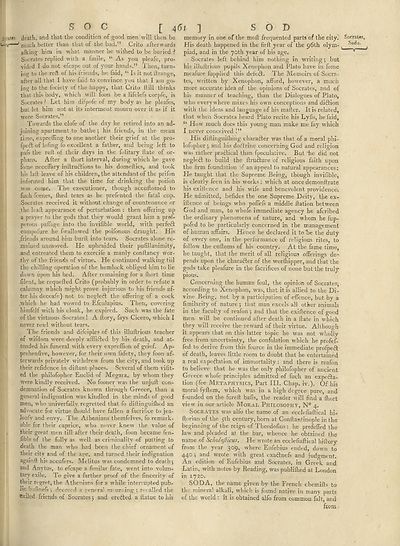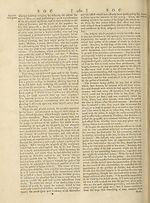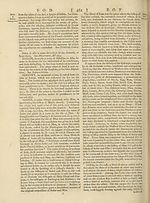Encyclopaedia Britannica, or, a Dictionary of arts, sciences, and miscellaneous literature : enlarged and improved. Illustrated with nearly six hundred engravings > Volume 19, Scripture-SUG
(507) Page 461
Download files
Complete book:
Individual page:
Thumbnail gallery: Grid view | List view

3 O C [ 461 ] SOD
; at#?, death, and that the condition of good men will then be
much better than that of the bad.” Crito afterwards
alking him in what manner he widled to be buried ?
Socrates replied with a fmile, “ As you pleafe, pro¬
vided I do not efcape out of your hands.” Then, turn¬
ing to the reft of his friends, he faid, “ Is it not ftrange,
after all that I have faid to convince you that I am go¬
ing to the fociety of the happy, that Crito ftill thinks
that this body, which will toon be a lifelefs corpfe, is
Socrates ? Let him difpofe of my body as he pleafes,
but let him not at its interment mourn over it as if it
were Socrates.”
Towards the clofe of the day he retired into an ad¬
joining apartment to bathe ; his friends, in the mean
time, exprefling to one another their grief at the pro-
fpe£l of lofing fo excellent a father, and being left to
pafs the reft of their days in the folitary ftate of or¬
phans. After a fhort interval, during which he gave
fome neceffary inftrudtions to his domeftics, and took
his laft leave of his children, the attendant of the prifon
informed him that the time for drinking the poifon
was come. The executioner, though accuftomed to
fuch fcenes, ftied tears as he prefented the fatal cup.
Socrates received it without change of countenance or
the leaft appearance of perturbation : then offering up
a prayer to the gods that they would grant him a prof-
perous paffage into the invifible world, with perfect
compofure he fwallowed the poifonous draught. His
friends around him burft into tears. Socrates alone re¬
mained unmoved. He upbraided their pufillanimity,
and entreated them to exercife a manly conftancy wor¬
thy of the friends of virtue. He continued walking tiil
the chilling operation of the hemlock obliged him to lie
down upon his bed. After remaining for a ftiort time
filent, he requefted Crito (probably in order to refute a
calumny which might prove injurious to his friends af¬
ter his deceafe) not to negleft the offering of a cock
j which he had vowed to Efculapius. Then, covering
himfelf with his cloak, he expired. Such was the fate
of the virtuous Socrates! A ftory, fays Cicero, which I
never read without tears.
The friends and difciples of this illuftrious teacher
of wifdom were deeply afflicted by his death, and at¬
tended his funeral with every expreflion of grief. Ap-
prehenfive, however, for their own fafety, they foon af¬
terwards privately withdrew from the city, and took up
their refidence in diftant places. Several of them vifit-
ed the philofopher Euclid of Megara, by whom they
j were kindly received. No fooner was the unjuft con¬
demnation of Socrates known through Greece, than a
general indignation was kindled in the minds of good
men, who univerfally regretted that fo diftinguiftied an
advocate for virtue (hould have fallen a faerifice to jea-
loufy and envy. The Athenians themfelves, fo remark¬
able for their caprice, who never knew the value of
their great men till after their death, foon became fen-
hble of the folly as well as criminality of putting to
death the man who had been the chief ornament of
their city and of the age, and turned their indignation
againft his accufers. Melitus was condemned to death;
and Anytus, to efcape a (imilar fate, went into volun¬
tary exile. To give a farther proof of the fincerity of
their regret, the Athenians for a while interrupted pub¬
lic bufinefs; decreed a genera; m urning ; recalled the
Exiled friends of Socrates; and eredled a ftatue to his
memory in one of the moft frequented parts of the city. Socrates,
Elis death happened in the firft year of the 96th olym- St)C*a-
piad, and in the 70th year of his age. *
Socrates left behind him nothing in writing; but
his illuftrious pupils Xenophon and Plato have in fome
meafure fupplied this defect. The Memoirs of Socra¬
tes, written by Xenophon, afford, however, a much
more accurate idea of the opinions of Socrates, and of
his manner of teaching, than the Dialogues of Plato,
who everywhere mixes his own conceptions and diftion
with the ideas and language of his mafter. It is related,
that when Socrates heard Plato recite his Lyfis, he faid,
“ How much does this young man make me fay which
I never conceived !”
His diftinguithing character was that of a moral phi¬
lofopher ; and his doctrine concerning God and religion
was rather practical than fpeculative. But die did not
negledt to build the ftrudture of religious faith upon
the firm foundation of an appeal to natural appearances:
Ele taught that the Supreme Being, though invifible,
is clearly feen in his works: which at oncedemonftrate
his exiftence and his wife and benevolent providences
He admitted, befides the one Supreme Deity, the ex¬
iftence of beings who poffefs a middle ftation between
God and man, to whofe immediate agency he afcribed
the ordinary phenomena of nature, and whom he fup-
pofed to be particularly concerned in the management
of human affairs. Hence he declared it to1oe the duty
of every one, in the performance of religious rites, to
follow the cuftoms of his country. At the fame time,
he taught, that the merit of all religious offerings de¬
pends upon the chara&er of the worfliipper, and that the
gods take pleafure in the facrifices of none but the truly
pious.
Concerning the human foul, the opinion of Socrates;
according to Xenophon, was, that it is allied to the Di¬
vine Being, not by a participation of effence, but by a
fimilarity of nature; that man excels all other animals
in the faculty of reafon ; and that the exiftence of good
men will be continued after death in a ftate in which
they will receive the reward of their virtue. Although
it appears that on this latter topic he was not wholly
free from uncertainty, the confolation which he profef-
fed to derive from this fource in the immediate profpeft
of death, leaves little room to doubt that he entertained
a real expectation of immortality : and there is reafon
to believe that he was the only philofopher of ancient
Greece whofe principles admitted of fuch an expecta¬
tion (fee Metaphysics, Part III. Chap. iv.). Of his
moral fyftem, which was in a high degree pure, and
founded on the fureft bafis, the reader will find a ftiort
view in our article Moral Philosophy, N° 4.
Socrates was alfo the name of an ecclefiaftical hi-
ftorian of the 5th century, born at Conftantinople in the
beginning of the reign of Theodofius : he profeffed the
law and pleaded at the bar, whence he obtained the
name of ScholaJIicus. He wrote an ecclefiaftical hiftory
from the year 309, where Eufebius ended, down to
440; and wrote with great exaCtnefs and iudgment.
An edition of Eufebius and Socrates, in Greek and
Latin, with notes by Reading, was publiftied at London
in 1720.
SODA, the name given by the French chemifts to
the mineral alkali, which is found native in manv parts
of the world : it is obtained alfo from common fait, and
from
; at#?, death, and that the condition of good men will then be
much better than that of the bad.” Crito afterwards
alking him in what manner he widled to be buried ?
Socrates replied with a fmile, “ As you pleafe, pro¬
vided I do not efcape out of your hands.” Then, turn¬
ing to the reft of his friends, he faid, “ Is it not ftrange,
after all that I have faid to convince you that I am go¬
ing to the fociety of the happy, that Crito ftill thinks
that this body, which will toon be a lifelefs corpfe, is
Socrates ? Let him difpofe of my body as he pleafes,
but let him not at its interment mourn over it as if it
were Socrates.”
Towards the clofe of the day he retired into an ad¬
joining apartment to bathe ; his friends, in the mean
time, exprefling to one another their grief at the pro-
fpe£l of lofing fo excellent a father, and being left to
pafs the reft of their days in the folitary ftate of or¬
phans. After a fhort interval, during which he gave
fome neceffary inftrudtions to his domeftics, and took
his laft leave of his children, the attendant of the prifon
informed him that the time for drinking the poifon
was come. The executioner, though accuftomed to
fuch fcenes, ftied tears as he prefented the fatal cup.
Socrates received it without change of countenance or
the leaft appearance of perturbation : then offering up
a prayer to the gods that they would grant him a prof-
perous paffage into the invifible world, with perfect
compofure he fwallowed the poifonous draught. His
friends around him burft into tears. Socrates alone re¬
mained unmoved. He upbraided their pufillanimity,
and entreated them to exercife a manly conftancy wor¬
thy of the friends of virtue. He continued walking tiil
the chilling operation of the hemlock obliged him to lie
down upon his bed. After remaining for a ftiort time
filent, he requefted Crito (probably in order to refute a
calumny which might prove injurious to his friends af¬
ter his deceafe) not to negleft the offering of a cock
j which he had vowed to Efculapius. Then, covering
himfelf with his cloak, he expired. Such was the fate
of the virtuous Socrates! A ftory, fays Cicero, which I
never read without tears.
The friends and difciples of this illuftrious teacher
of wifdom were deeply afflicted by his death, and at¬
tended his funeral with every expreflion of grief. Ap-
prehenfive, however, for their own fafety, they foon af¬
terwards privately withdrew from the city, and took up
their refidence in diftant places. Several of them vifit-
ed the philofopher Euclid of Megara, by whom they
j were kindly received. No fooner was the unjuft con¬
demnation of Socrates known through Greece, than a
general indignation was kindled in the minds of good
men, who univerfally regretted that fo diftinguiftied an
advocate for virtue (hould have fallen a faerifice to jea-
loufy and envy. The Athenians themfelves, fo remark¬
able for their caprice, who never knew the value of
their great men till after their death, foon became fen-
hble of the folly as well as criminality of putting to
death the man who had been the chief ornament of
their city and of the age, and turned their indignation
againft his accufers. Melitus was condemned to death;
and Anytus, to efcape a (imilar fate, went into volun¬
tary exile. To give a farther proof of the fincerity of
their regret, the Athenians for a while interrupted pub¬
lic bufinefs; decreed a genera; m urning ; recalled the
Exiled friends of Socrates; and eredled a ftatue to his
memory in one of the moft frequented parts of the city. Socrates,
Elis death happened in the firft year of the 96th olym- St)C*a-
piad, and in the 70th year of his age. *
Socrates left behind him nothing in writing; but
his illuftrious pupils Xenophon and Plato have in fome
meafure fupplied this defect. The Memoirs of Socra¬
tes, written by Xenophon, afford, however, a much
more accurate idea of the opinions of Socrates, and of
his manner of teaching, than the Dialogues of Plato,
who everywhere mixes his own conceptions and diftion
with the ideas and language of his mafter. It is related,
that when Socrates heard Plato recite his Lyfis, he faid,
“ How much does this young man make me fay which
I never conceived !”
His diftinguithing character was that of a moral phi¬
lofopher ; and his doctrine concerning God and religion
was rather practical than fpeculative. But die did not
negledt to build the ftrudture of religious faith upon
the firm foundation of an appeal to natural appearances:
Ele taught that the Supreme Being, though invifible,
is clearly feen in his works: which at oncedemonftrate
his exiftence and his wife and benevolent providences
He admitted, befides the one Supreme Deity, the ex¬
iftence of beings who poffefs a middle ftation between
God and man, to whofe immediate agency he afcribed
the ordinary phenomena of nature, and whom he fup-
pofed to be particularly concerned in the management
of human affairs. Hence he declared it to1oe the duty
of every one, in the performance of religious rites, to
follow the cuftoms of his country. At the fame time,
he taught, that the merit of all religious offerings de¬
pends upon the chara&er of the worfliipper, and that the
gods take pleafure in the facrifices of none but the truly
pious.
Concerning the human foul, the opinion of Socrates;
according to Xenophon, was, that it is allied to the Di¬
vine Being, not by a participation of effence, but by a
fimilarity of nature; that man excels all other animals
in the faculty of reafon ; and that the exiftence of good
men will be continued after death in a ftate in which
they will receive the reward of their virtue. Although
it appears that on this latter topic he was not wholly
free from uncertainty, the confolation which he profef-
fed to derive from this fource in the immediate profpeft
of death, leaves little room to doubt that he entertained
a real expectation of immortality : and there is reafon
to believe that he was the only philofopher of ancient
Greece whofe principles admitted of fuch an expecta¬
tion (fee Metaphysics, Part III. Chap. iv.). Of his
moral fyftem, which was in a high degree pure, and
founded on the fureft bafis, the reader will find a ftiort
view in our article Moral Philosophy, N° 4.
Socrates was alfo the name of an ecclefiaftical hi-
ftorian of the 5th century, born at Conftantinople in the
beginning of the reign of Theodofius : he profeffed the
law and pleaded at the bar, whence he obtained the
name of ScholaJIicus. He wrote an ecclefiaftical hiftory
from the year 309, where Eufebius ended, down to
440; and wrote with great exaCtnefs and iudgment.
An edition of Eufebius and Socrates, in Greek and
Latin, with notes by Reading, was publiftied at London
in 1720.
SODA, the name given by the French chemifts to
the mineral alkali, which is found native in manv parts
of the world : it is obtained alfo from common fait, and
from
Set display mode to:
![]() Universal Viewer |
Universal Viewer | ![]() Mirador |
Large image | Transcription
Mirador |
Large image | Transcription
Images and transcriptions on this page, including medium image downloads, may be used under the Creative Commons Attribution 4.0 International Licence unless otherwise stated. ![]()
| Permanent URL | https://digital.nls.uk/192701873 |
|---|
| Attribution and copyright: |
|
|---|
| Description | Ten editions of 'Encyclopaedia Britannica', issued from 1768-1903, in 231 volumes. Originally issued in 100 weekly parts (3 volumes) between 1768 and 1771 by publishers: Colin Macfarquhar and Andrew Bell (Edinburgh); editor: William Smellie: engraver: Andrew Bell. Expanded editions in the 19th century featured more volumes and contributions from leading experts in their fields. Managed and published in Edinburgh up to the 9th edition (25 volumes, from 1875-1889); the 10th edition (1902-1903) re-issued the 9th edition, with 11 supplementary volumes. |
|---|---|
| Additional NLS resources: |
|

